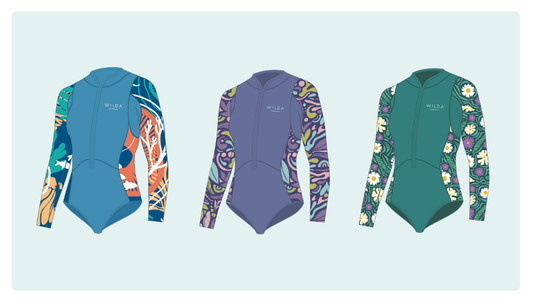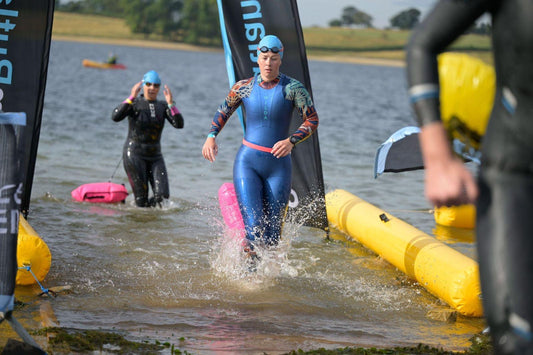The number of UK outdoor swimmers increased three-fold from 2019 to 2021 and continues to increase in popularity in the UK and around the world. There is lots of anecdotal evidence that cold water immersion can improve mood, increase energy levels, reduce pain, and improve blood sugar control and the science to back this up is also increasing. This blog is a brief overview of what we believe to be the benefits. If you’re really interested then we’d also recommend reading “Chill” by Dr Mark Harper. It’s a great read!
So what happens when I go for a cold dip?
You’ve arrived at the water excited and equally anxious to get in. You dip your toes, ankles, knees, and hips. Up to your chest and shoulders. Gasp! Within milliseconds, a sudden drop in your core body temperature causes the release of stress hormones (cortisol, adrenaline and noradrenaline). Heart rate and breathing rate increase and blood flow is directed to your major organs including the brain. You feel alert and alive. This is the cold shock response. It takes several minutes to recover and slow breathing. Before starting to swim, it is really important to take the time to recover from the cold shock, try to control your breathing and relax. It gets easier with time!
Will it improve my mental wellbeing?
The release of the stress hormones in response to cold shock can potentially improve adaptation to other stressful events in life and thus help with mood and anxiety. Increasing evidence is suggesting cold water swimming can improve clinical measures of anxiety and depression and improve wellbeing and positive mood states. Outdoor swimming offers a range of benefits other than just cold therapy. Being outside in blue and green spaces can improve wellbeing and help develop a greater connection with the natural world. Swimming with someone else or in a group can also help reduce social isolation.
Does it improve physical health?
The benefits of outdoor swimming are most likely two-fold in terms of physical health. Firstly, swimming is exercise and exercise is of course good. Secondly there is increasing evidence cold water immersion alone can have similar beneficial effects of physical health and possibly reduce risk of neurodegenerative conditions like dementia. Swimming causes an overall cardiovascular risk reduction, seen most in older women. Although cold shock will cause an initial increase in heart rate and blood pressure, these reduce over time. Good cholesterol (HDL) may increase and bad cholesterol (LDL) may reduce in cold water swimmers, as does insulin sensitivity and blood sugar control. Cold water swimming, through the release of stress hormones may have an acute positive effect on pain but overtime may also help alleviate chronic pain in conditions such as rheumatoid arthritis and fibromyalgia.
What are the risks of cold water?
Sea temperatures in the UK range from 0-7C in the winter and 15-20C in the summer. Smaller bodies of water such as lakes will inevitably have a wider range of temperatures. The initial cold shock can pose a risk to any swimmer. Make sure to recover from the shock before swimming. A reduction in blood flow to the body surface and muscles can lead to difficulty moving. Start in the summer and for a couple of minutes and gradually acclimatise to colder and longer swims. Swimmers with heart disease or high blood pressure, although swimming will improve your health, are at increased risk with cold shock with the sudden increase in blood pressure and heart rate. Always consult a health professional before starting and start warm and short before cold and long.
What can I do to reduce the risk and increase enjoyment?
- Start with quick dips and increase time in the water slowly over days to weeks
- Start in summer when the water is warmer
- Wear a wetsuit
- Wear neoprene socks and gloves
- Join an outdoor swimming group - the Outdoor Swimming Society is a great resource.
- Consult a health professional for individual advice
Sources
https://chilluk.org/wp-content/uploads/2022/12/Sea-swimming-as-a-novel-intervention-for-depression-and-anxiety-MENPA.pdf
https://www.sciencedirect.com/science/article/pii/S0272494423001214#:~:text=%2D%20Reductions%20in%20mean%20PHQ%2D9,to%20anxious%20and%20depressive%20symptoms
https://bjsm.bmj.com/content/56/23/1332
https://seatemperature.info/united-kingdom-water-temperature.html
https://www.frontiersin.org/articles/10.3389/fphys.2023.1223558/full
https://www.acc.org/latest-in-cardiology/journal-scans/2012/01/24/23/35/effects-of-swimming-training-on-blood-pressure-and-vascular-function#:~:text=Casual%20systolic%we 20blood%20pressure%20
https://pubmed.ncbi.nlm.nih.gov/33971893/
https://www.ncbi.nlm.nih.gov/pmc/articles/PMC8955208/
https://pubmed.ncbi.nlm.nih.gov/26966319/
https://ukdri.ac.uk/news-and-events/gene-therapy-approach-to-boost-cold-shock-protein-in-the-brain-without-cooling-protects-mice-against-neurodegenerative-disease
https://www.ncbi.nlm.nih.gov/pmc/articles/PMC9518606/
https://pubmed.ncbi.nlm.nih.gov/35021915/#:~:text=Conclusions%3A%20Cold%2Dwater%20immersion%20decreased,increase%20the%20quality%20of%20life



